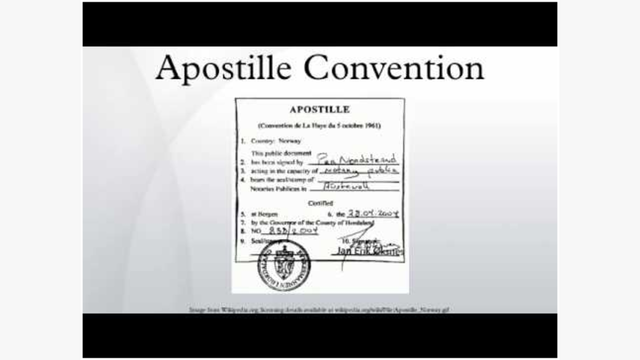Christine Edwards hasn't added a story.
What is the Apostille Convention? The Hague Convention Abolishing the Requirement of Legalisation for Foreign Public Documents or the Apostille Convention is an agreement among the state parties to the convention specifying the legal modes to which a document issued in one country can be certified for legal purposes. The Convention took effect on January 14, 1965 and involved 112 state parties or signatory states.
Certification of legal documents to be issued abroad is important in order to give the said document legal effect and to make it enforceable among the parties involved. And the said process is what is called as apostille and it should be understood that such certification will only involve the states who are signatories to the said convention. For non-signatory states, a different set of rule is involved.
The process of international certification is designated by the government to Competent Authorities. Each country has their own set of designated competent authorities who can perform apostilles. For example, the United States has the Secretary of State of each state designated as competent authorities. Apostille California and apostille Los Angeles can therefore be performed by those designated by the government. In India, international certification of documents is performed by the Ministry of External Affairs while in Japan,apostille certification is obtained from the Ministry of Foreign Affairs.
For a document to be eligible for an apostille, the document must be issued by a competent or recognized officer who is also recognized by the authority who will issue the apostille. In some cases, for example, specimen signatures are maintained by the State in order to keep track of notaries public who are authorized to issue documents or perform apostilles.
How About Documents Issued by Non-Signatory State?
A question now arises as to what processes are involved for international certification of documents issued by a non-signatory state. With this, a non-signatory state must provide for rules on how foreign documents can be certified. Most often, the practice is for the non-signatory state to require certification by the foreign ministry of the country where the document was issued or where it originated. After this process, the document will then be certified again by the receiving non-signatory state. In essence, the document will have to be certified twice before it can have any legal effect or before it can be executed in the receiving state. For example, a legal document executed in Canada, a non-signatory state, will have to be certified by the Deputy Ministry of Foreign Affairs by the Canadian consular official abroad and will then be subsequently subjected to another certification by the consulate or by the government of the receiving state.
What are the Eligible Documents?
Understanding all about apostilles is important especially if you are dealing with legal documents to be given effect abroad. Basically there are four types of documents that were mentioned in the 1961 Apostille Convention which includes the following:
- Court Documents
- Administrative Documents
- Notarial Acts
- Official Certificates
Set as ?
The campaign video will appear in social media and email.
The campaign cover picture will appear in social media and email.
The will appear at the top of your campaign page and in social media and email.
Reset ?
It will be removed from the top of your campaign and won't be used as default in social media and email. The will remain in the media gallery.
Share
Embed
Share a link
Delete update
Delete this story update?
Any pictures or videos will remain in the campaign's media gallery.
Report campaign
Report submitted
Thank you. We take reports like yours very seriously. Our goal is to keep the community safe.
Please know that we may contact you for more information, but that we won't notify you personally of our decision. If the campaign remains available within a few days, it's likely that we determined it not to be in violation of our policies.
Thank you. We've already received your previous report. If the campaign remains available within a few days, it's likely that we determined it not to be in violation of our policies.
Tell us about the problem. Please fill in both fields below.
Record a video
Upload a video
Nothing grabs attention for your cause like a personal video. Take a minute or two to record one now. Record a short video message of support. Or upload one from your device. You can preview or redo your video before you post it.
Nothing grabs attention for your cause like a personal video. Upload a short video message of support. Upload a short video message of support. Or record one right now.
- Most effective video length: about a minute.
- Maximum length: 5 min.
- You can preview or redo your video before you post it.
Heads up! The existing video will be replaced.
Email your friends
Join our team
Your endorsement banner
Use your endorsement banner to tell why our cause matters to you. Such personal endorsements are proven to increase campaign contributions. When enabled, your endorsement banner appears at the top of the campaign for everyone who visits a link you shared.
You can always adjust your endorsement from the campaign Share page—even if it's been disabled.
Your message
Tell people why our cause matters to you. Your personal message will encourage others to help. Easy, effective, optional.
Say it in video
Short personal videos by supporters like you are incredibly powerful. Record one right now and you'll help us raise more money. Easy, optional, effective.
Add a personal goal
Set a personal fundraising goal. You'll encourage more contributions if you do. And rest easy. There's no obligation to achieve your goal or bad consequences if you don't. Easy, optional, effective.
We have a video!
Video thumbnail
We'd love to show you our campaign video. Want to take a look?
, you're already on the team.

